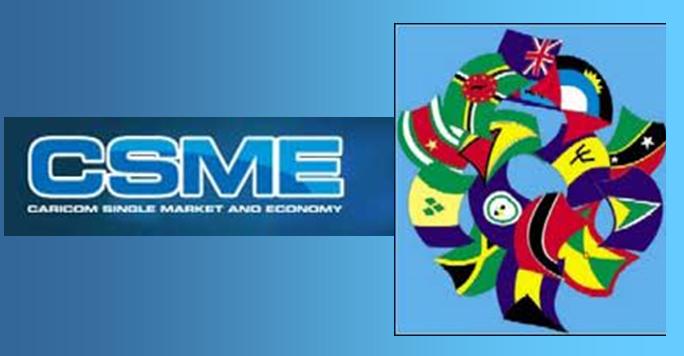GEORGETOWN, Guyana (CMC) — Caribbean Community (CARICOM) leaders will be “taking a look at the thorny issues” confronting the full implementation of the CARICOM Single Market and Economy (CSME) during their three-day summit here, which opened on Monday night.
Barbados Prime Minister Freundel Stuart, who has lead responsibility for the CSME within the quasi-CARICOM cabinet, told the Caribbean Media Corporation (CMC) that while he was not in a position to outline the recommendations going before the leaders at this time, he was certain that the initiative had been very beneficial so far to the Caribbean population.
Trinidad and Tobago’s Prime Minister, Keith Rowley, has already indicated that Port of Spain would be placing on the regional agenda the issue of the CSME that is observing its 10th anniversary.
The CSME allows for the free movement of goods, skills, labour and services across the region, but it has been dogged by various problems including allegations by some regional countries that their nationals are not being allowed to freely enter member states.
Stuart told CMC that the speech delivered by his St. Vincent and the Grenadines counterpart, Ralph Gonsalves, in which he was critical of people who felt that CARICOM had been a failure, was “very interesting in that regard, because, as I said in Barbados last year (CARICOM summit), we have a way of tending to accentuate what has not happened and a way of losing sight of in fact what has happened.
“I do not think that the situation is as grave as I heard described. I think the focus is on what has not yet happened.
“Let us be very frank about it that over the last seven to eight years our region has been under pressure from events taking place in the international environment. Most of our member states have had to be inward looking with a view to ensuring that they deal with the hot immediacies of everyday governance”.
But he told CMC that at this summit “we are going to be having a look at what are the thorny issues that need to be resolved, what are the mountains we need to climb to bring to full or near full realisation the Caribbean Single Market and Economy”.
CARICOM chairman, Dominica Prime Minister Roosevelt Skerrit, speaking at the ceremonial opening of the summit on Monday said, “I cannot understand why we have not completed the essential infrastructure to facilitate movement towards an effective free trade area, a meaningful Community or a Single Market and Economy”.
He questioned why the initiative has so far failed to gain the necessary traction, saying “there is no doubt whatsoever that the essential infrastructure to facilitate economic cooperation and growth in CARICOM is incomplete.
“Let us not ignore the fact that we have made some progress,” he said, noting, for example, the region has seen movement in the fourth priority, which is a productive regionally integrated labour market, including a long-range view of the skills needed their movement and how work is done”.
But Skerrit sought to underscore the need for greater cooperation among Caribbean countries noting that “it takes two hands to clap.
“CARICOM is not about imposing policies and programmes on member states. It is about empowering member states by democratic means. A major responsibility, therefore, falls at the level of Member States to get things moving.
“For example, we have agreed on any number of measures to advance the CARICOM Single Market and Economy and our officials have completed all the necessary technical work.
However, due to the failure of our member states to give the go ahead, those critical measures remain unattended. There are several other cases, which can be listed as demonstrating that there can be movement in other areas of the CSME. Their completion could enhance our competitiveness and create considerable opportunities for our Community.”







The problem of a lack of “comparative advantage” will plague further integration because so many CARICOM countries have few resources — human, environmental, technological, etc. — to allow them to specialise in areas that would benefit both themselves and other member countries. Sometimes the whole is actually smaller than the sum of the parts.
There is also the issue of economies of scale: Trinidad and Guyana could easily supply the rest of CARICOM with all the tropical food they would ever need far cheaper than anything that could be produced locally. The result would further devastate agricultural production in little SVG.
The only way to actually promote economic integration would be to join it with political integration, something that will never happen.
You may be right but that would all be very difficult. I would say that the biggest problems are not physical but mental. most in the Caribbean have a terrible work ethic, many are more interested in cheating each other than creating a fair deal. Developing resources Is more the problem than not having any. SVG has very great resources but we have never had a leader smart enough to know how to sustainably use them for the benefit of the country. (for example: the Clinton Foundation gets all the profits of our geo-thermal) This is only a start to mentioning the problems. The SVG government and possibly most of the others think backwards and the policies they craft actually hurt the country as they aggressively raise taxes to enable more spending money they do not have until our grandchildren are taxed to pay the interest on the borrowing.
JATS – Just another talk shop.